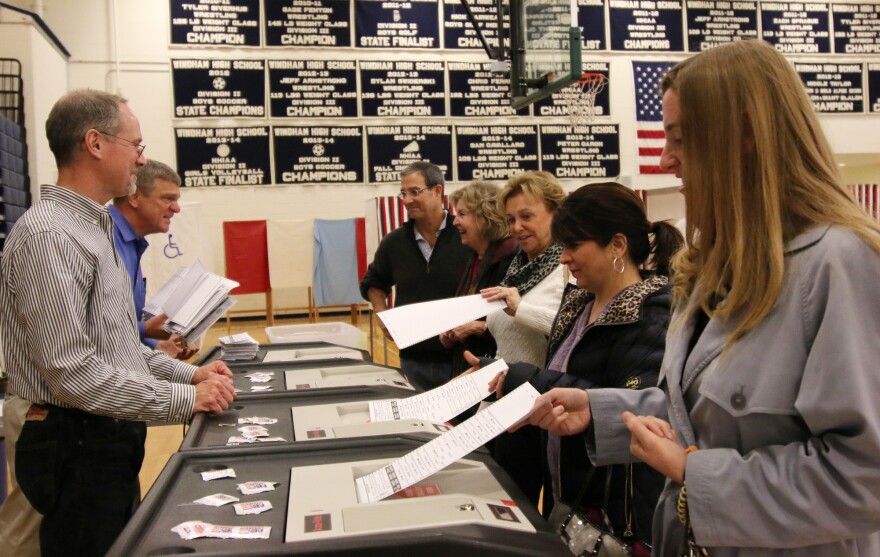The Secretary of State’s office had to backtrack this week on its instructions about how to handle voters flagged through the Interstate Voter Registration Crosscheck System. It initially suggested local checklist supervisors could remove people from local rolls without notifying them first.
The Crosscheck system is a multi-state database that’s been promoted as a tool to catch potential cases of voter fraud — in part, because it’s designed to flag people who are registered in multiple states. New Hampshire agreed to join the program last year. (The system has been championed by Kansas Secretary of State Kris Kobach, the chair of the Trump administration’s election commission who recently came under fire for alleging that out-of-state voters swayed the outcome of New Hampshire's elections.)
In most cases – unless there’s been official notice that the voter has died or moved elsewhere – election supervisors who think a voter should be removed from the checklist are required by state law to send that voter a notice before taking any action. That way, the voter has a chance make their case before they’re marked as inactive.
But local election officials who logged into the statewide election website earlier this week were greeted with a different message: a list of local voters who were flagged in the Crosscheck system for being registered in another state, and a directive that it would be okay to strike their names from the checklist.

According to a copy of the original notice provided to NHPR, the state said supervisors “have the option to send the voter a 30 day Letter, but should do so only if they have reason to doubt the validity of the notice of transfer.”
It’s unclear how long the directions were online, or whether any towns started the process of removing any names from their rolls based on this guidance. Officials with the Secretary of State’s office did not return calls for comment as of press time.
Rep. David Bates, a Republican state lawmaker who’s also a local checklist supervisor in Windham, says he first noticed the instructions on Monday. Concerned that the instructions “were not proper,” Bates says he then contacted the Secretary of State’s office and the attorney general with concerns.
In part, Bates was concerned that the guidance on the ElectioNet website implied that checklist supervisors should interpret the names flagged through the Crosscheck program as an official notice that those voters are registered elsewhere.
State law says such notices are supposed to come directly from another state or a “duly authorized board of registration from a community outside New Hampshire.” And, Bates says, Crosscheck doesn’t seem to meet those qualifications.
“It’s an amalgamation from various states. While it originally initiates from states, it’s coming from Crosscheck,” Bates says. “The program is not a state, not a board of registrars.”

By Tuesday morning, the Secretary of State’s office sent an email to all clerks and supervisors telling them not to take any action on voters flagged through Crosscheck until further notice. The same email asked local officials who already started moving ahead to initiate the removal of any names from the checklists to contact the HAVA Help Desk.
“The Secretary of State’s Office will notify you soon regarding how New Hampshire will proceed with addressing voters identified through the Interstate Cross Check,” the state told local officials in the notice sent Tuesday.
Bates says he was glad to see the state take action after he raised concerns, but he was “puzzled how an instruction that, in my opinion, is clearly erroneous, could get sent out like that without being caught by anybody.”
“That would have been serious, if supervisors had started removing scores of people from the checklist,” Bates says. “That would have been a real problem.”
And more broadly speaking, Bates says he thinks Crosscheck could be a valuable tool for New Hampshire election officials — as long as it’s used responsibly.
“It is a useful tool to help keep our lists up-to-date, but it has to be implemented properly,” Bates says. “And there needs to be some effort on the part of the supervisors to do their due diligence and be sure they check on whether or not the names on that checklists or on that list from the Crosscheck program are indeed qualified to vote in the town or not. They can’t just be indiscriminately removed.”
This story has been updated to correct an error regarding the Crosscheck program. Kansas Secretary of State Kris Kobach did not create the program, though his office oversees its administration. It launched in 2005, before he became Secretary of State.








